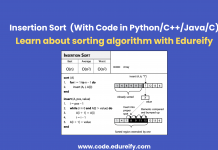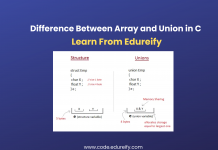C is a general-motive programming language created through Dennis Ritchie on the Bell Laboratories in 1972. It is a completely famous language, no matter how old it is. C is strongly related to UNIX because it evolved to jot down the UNIX working system.
Why Learn C Language?
It is one of the most famous programming languages withinside the world. If you recognize C, you’ll haven’t any hassle mastering different famous programming languages together with Java, Python, C++, C#, etc, because the syntax is similar. C could be very fast, as compared to different programming languages, like Java and Python. C could be very versatile; it may be utilized in each program and technology.
Difference between C and C++
C++ become evolved as an extension of C, and each language has nearly the identical syntax
The important distinction between C and C++ is that C++ aids instructions and objects, whilst C does not. Download the Edureify app to know more about these courses.
C is a computer programming language. That means that you can use C to create lists of instructions for a computer to follow. C is one of the thousands of programming languages currently in use. C has been around for several decades and has won widespread acceptance because it gives programmers maximum control and efficiency. C is an easy language to learn. It is a bit more cryptic in its style than some other languages, but you get beyond that fairly quickly.
C is what is called a compiled language. This means that once you write your C program, you must run it through a C compiler to turn your program into an executable that the computer can run (execute). The C program is the human-readable form, while the executable that comes out of the compiler is the machine-readable and executable form.
What this means is that to write and run a C program, you must have access to a C compiler. If you are using a UNIX machine (for example, if you are writing CGI scripts in C on your host’s UNIX computer, or if you are a student working on a lab’s UNIX machine), the C compiler is available for free. It is called either “cc” or “GCC” and is available on the command line. If you are a student, then the school will likely provide you with a compiler — find out what the school is using and learn about it. If you are working at home on a Windows machine, you are going to need to download a free C compiler or purchase a commercial compiler. A widely used commercial compiler is Microsoft’s Visual C++ environment (it compiles both C and C++ programs). Unfortunately, this program costs several hundred dollars. If you do not have hundreds of dollars to spend on a commercial compiler, then you can use one of the free compilers available on the Web.
The components of the C Language structure.
- Header Files Inclusion: The first and foremost component is the inclusion of the Header files in a C program. A header file is a file with extension .h which contains C function declarations and macro definitions to be shared between several source files.
Some of the C Header files:
- h – Defines several useful types and macros.
- h – Defines exact width integer types.
- h – Defines core input and output functions
- h – Defines numeric conversion functions, pseudo-random network generator, and memory allocation
- h – Defines string handling functions
- h – Defines common mathematical functions
- Main Method Declaration: The next part of a C program is to declare the main() function. The syntax to declare the main function
- Variable Declaration: The next part of any C program is the variable declaration. It refers to the variables that are to be used in the function. Please note that in the C program, no variable can be used without being declared. Also in a C program, the variables are to be declared before any operation in the function.
- Body: The body of a function in the C program, refers to the operations that are performed in the functions. It can be anything like manipulations, searching, sorting, printing, etc.
- Return Statement: The last part of any C program is the return statement. The return statement refers to the returning of the values from a function. This return statement and return value depend upon the return type of the function. For example, if the return type is void, then there will be no return statement. In any other case, there will be a return statement and the return value will be of the type of the specified return type. Visit the official website of Eduriefy to get all the details regarding the courses.
Example of C Programming Language
Question:-
int main(void)
{
print("Quiz");
return 0;
}
Answer:- Let us analyze the program line by line.
- Line 1: [ #include <stdio.h> ] In a C program, all lines that start with # are processed by a preprocessor which is a program invoked by the compiler. In a very basic term, the preprocessor takes a C program and produces another C program.
- Line 2 [ int main(void) ] There must be a starting point from where execution of compiled C program begins. In C, the execution typically begins with the first line of main(). The void written in brackets indicates that the main doesn’t take any parameter (See this for more details). main() can be written to take parameters also.
- Line 3 and 6: [ { and } ] In C language, a pair of curly brackets define the scope and are mainly used in functions and control statements like if, else, and loops. All functions must start and end with curly brackets.
- Line 4 [ print(“Quiz”); ] printf() is a standard library function to print something on standard output. The semicolon at the end of print indicates line termination. In C, a semicolon is always used to indicate the end of a statement.
- Line 5 [ return 0; ] The return statement returns the value from the main(). The returned value may be used by an operating system to know the termination status of your program. The value 0 typically means successful termination.
How to execute the above program:
To execute the above program, we need to first compile it using a compiler and then we can run the generated executable.
C is the mother of all computer programming languages, which is widely used within the world of coding. Learn C programming from basic to advanced and start your journey into the insightful world of Computer Science. Join the courses provided by Eduriefy now and attain immense benefits in your future career.
Frequently Asked Questions (FAQs)
Question:- What are the basic parts of a C program?
Answer:- Parts of a C program
#include statements (preprocessor directives)
reserved words : (e.g., int, double, return, main, include, etc.)
variables : (similar to Matlab)
builtin functions (library functions) (print, …)
{} ( similar to start and end of functions)
main function.
comments.
Question:- What are the basic Data Types supported in C Programming Language?
Ans: The Datatypes in C Language are broadly classified into 4 categories. They are as follows:
- Basic Data Types
- Derived Data Types
- Enumerated Data Types
- Void Data Types
Question:- What do you mean by Dangling Pointer Variable in C Programming?
Ans: A Pointer in C Programming is used to point to the memory location of an existing variable. In case that particular variable is deleted and the Pointer is still pointing to the same memory location, then that particular pointer variable is called a Dangling Pointer Variable.
Question:- What do you mean by the Scope of the variable? What is the scope of the variables in C?
Ans: The scope of the variable can be defined as the part of the code area where the variables declared in the program can be accessed directly. In C, all identifiers are lexically (or statically) scoped.
Question:- What are static variables and functions?
Ans: The variables and functions that are declared using the keyword Static are considered as Static Variable and Static Functions. The variables declared using the Static keyword will have their scope restricted to the function in which they are declared.
Master Your Coding Skills with BootSelf AI
If you're looking to enhance your coding abilities and upskill in artificial intelligence, look no further than the BootSelf AI app. This innovative platform provides AI-based coding lessons that are tailored to your individual learning pace.
Available on both iOS and Android, you can download the BootSelf AI app and start mastering coding skills today:









